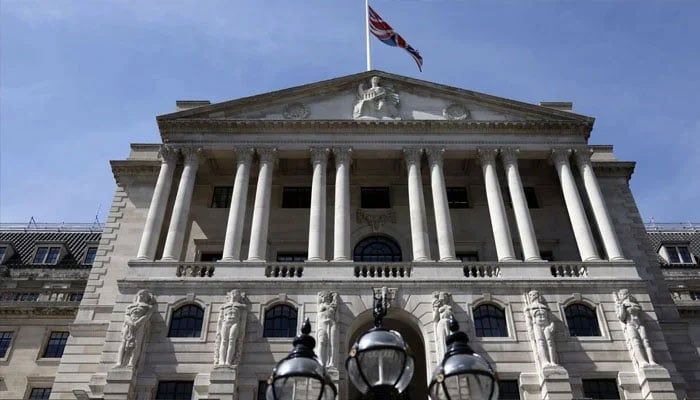BoE's fears Red Sea hostilities could boost UK inflation
LONDON: Bank of England rate-setter Catherine Mann said on Thursday that supply chain disruption from hostilities in the Red Sea could quickly feed into companies' pricing decisions, exacerbating Britain's inflation problem.
Mann said her decision last week to vote to raise interest rates to 5.5% from 5.25% was "not easy". Most Monetary Policy Committee members voted to leave rates on hold, and one voted for a cut.
But she added that the prospect of rising real incomes, tightness in the labour market, and the fact financial conditions in Britain had in her view loosened by too much explained her vote to raise interest rates by a quarter of a percentage point.
Last week the BoE said inflation was on track to fall to its 2% target by the middle of this year, before picking up again later in 2024 and then remaining above target until late 2026 - based on the market path for interest rates.
Mann warned the outlook for British inflation was vulnerable to upside shocks, including from events in the Red Sea, a major trade route between Asia and Europe..
Attacks on shipping by Houthi militants have raised freight prices and lengthened delivery times. Brent crude oil prices exceeded $80 a barrel on Thursday.
In a speech to the Official Monetary and Financial Institutions Forum (OMFIF), Mann said this conflict could affect inflation in the near-term but also influence corporate pricing decisions - something that would further embed inflation pressure in the economy.
"I worry that such an upward inflation shock coming on the heels of the recent high inflation environment will be more swiftly incorporated into firms' costs and prices, exacerbating upside momentum," she said.
Ongoing Brexit frictions and the reconfiguration of global supply chains could also add to goods price inflation in the medium-term, despite lower goods prices currently being the major factor in dragging headline inflation down.
"My assessment is that the dynamics of headline inflation is not a good guide to prospects in the medium-term on account of direct energy price dynamics," Mann said.
Meanwhile: the BoEDeputy Governor Sarah Breeden said she had become less worried that interest rates would need to rise again as inflation pressures gradually abate.
Breeden, the Monetary Policy Committee's newest member, said she was now thinking about how long interest rates would need to stay at their current level, instead of whether they would need to rise further.
"As I have become more confident that persistence is likely to evolve as embodied within our forecast, I have become less concerned that rates might need to be tightened further," Breeden said in a speech for the UK Women in Economics Annual Networking Event.
Her language was very similar to that of Governor Andrew Bailey last week, when he opened up the possibility of cutting borrowing costs at some point as the BoE held its Bank Rate at 5.25%.
Breeden said she was encouraged by inflation pressure receding in other advanced economies.
"But I need to see further evidence to be confident that the UK economy is progressing as set out in our forecast," she said.
Breeden said she would be monitoring wage data and company pricing decisions closely in the coming months.
-
 Savannah Guthrie Shares Sweet Childhood Video With Missing Mom Nancy: Watch
Savannah Guthrie Shares Sweet Childhood Video With Missing Mom Nancy: Watch -
 Over $1.5 Million Raised To Support Van Der Beek's Family
Over $1.5 Million Raised To Support Van Der Beek's Family -
 Diana Once Used Salad Dressing As A Weapon Against Charles: Inside Their Fight From A Staffers Eyes
Diana Once Used Salad Dressing As A Weapon Against Charles: Inside Their Fight From A Staffers Eyes -
 Paul Anthony Kelly Opens Up On 'nervousness' Of Playing JFK Jr.
Paul Anthony Kelly Opens Up On 'nervousness' Of Playing JFK Jr. -
 Video Of Brad Pitt, Tom Cruise 'fighting' Over Epstein Shocks Hollywood Fans
Video Of Brad Pitt, Tom Cruise 'fighting' Over Epstein Shocks Hollywood Fans -
 Jelly Roll's Wife Bunnie Xo Talks About His Huge Weight Loss
Jelly Roll's Wife Bunnie Xo Talks About His Huge Weight Loss -
 Margot Robbie Reveals Why She Clicked So Fast With Jacob Elordi
Margot Robbie Reveals Why She Clicked So Fast With Jacob Elordi -
 Piers Morgan Praised By Ukrainian President Over 'principled Stance' On Winter Olympics Controversy
Piers Morgan Praised By Ukrainian President Over 'principled Stance' On Winter Olympics Controversy -
 Halsey's Fiance Avan Jogia Shares Rare Update On Wedding Planning
Halsey's Fiance Avan Jogia Shares Rare Update On Wedding Planning -
 Instagram Head Adam Mosseri Says Users Cannot Be Clinically Addicted To App
Instagram Head Adam Mosseri Says Users Cannot Be Clinically Addicted To App -
 James Van Der Beek Was Working On THIS Secret Project Before Death
James Van Der Beek Was Working On THIS Secret Project Before Death -
 Las Vegas Father Shoots Daughter's Boyfriend, Then Calls Police Himself
Las Vegas Father Shoots Daughter's Boyfriend, Then Calls Police Himself -
 'Hunger Games' Star Jena Malone Shocks Fans With Huge Announcement
'Hunger Games' Star Jena Malone Shocks Fans With Huge Announcement -
 Ex-OpenAI Researcher Quits Over ChatGPT Ads
Ex-OpenAI Researcher Quits Over ChatGPT Ads -
 Prince William Criticized Over Indirect Epstein Connection
Prince William Criticized Over Indirect Epstein Connection -
 'Finding Her Edge' Creator Explains Likeness Between Show And Jane Austin Novel
'Finding Her Edge' Creator Explains Likeness Between Show And Jane Austin Novel




